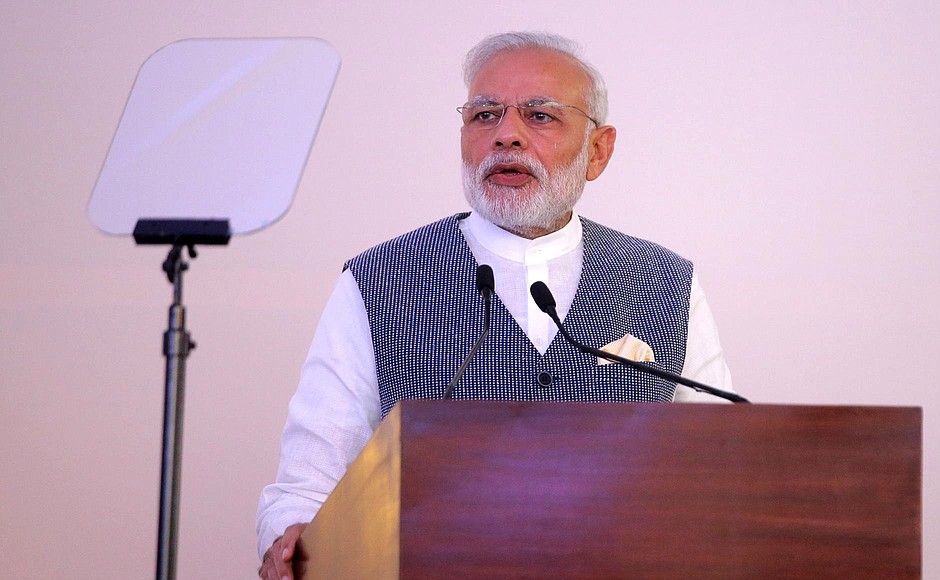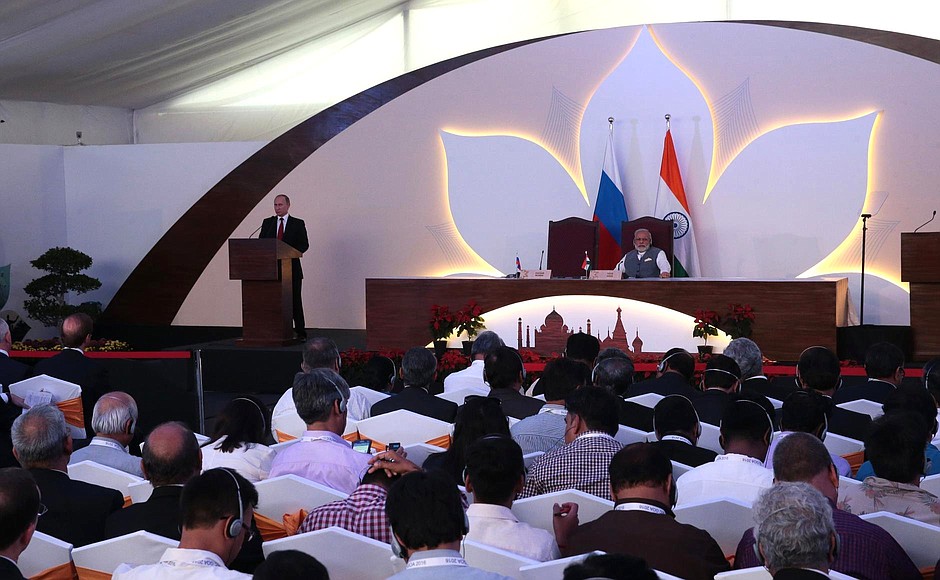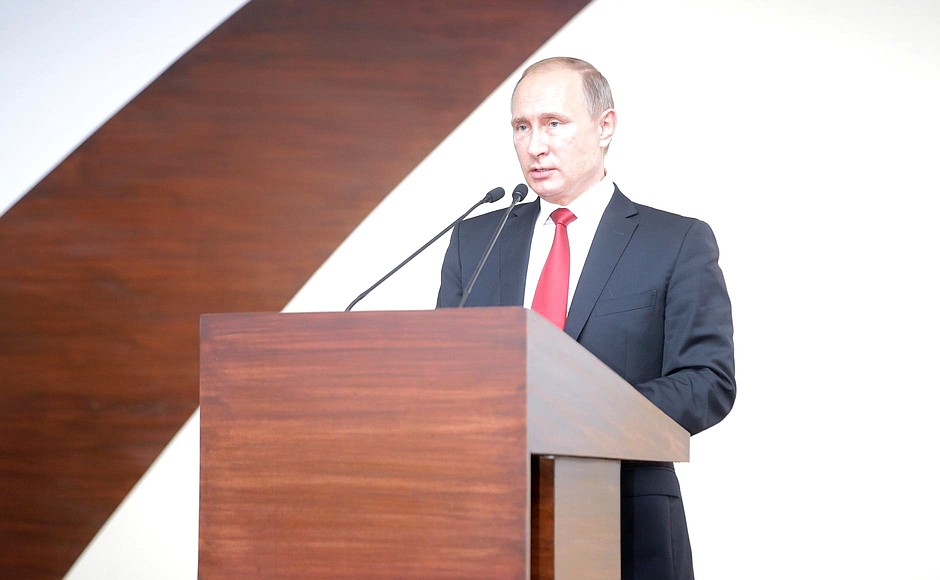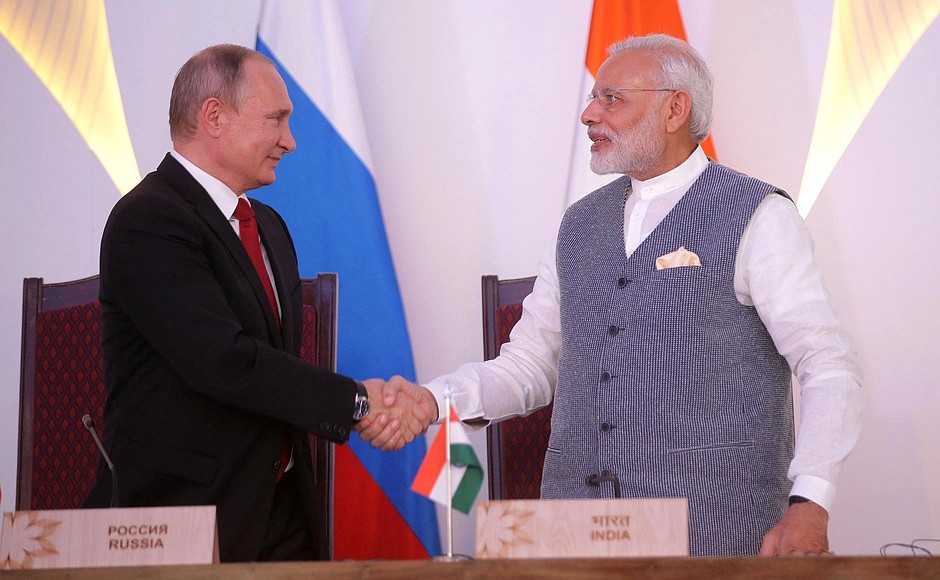President of Russia Vladimir Putin: Mr Prime Minister, ladies and gentlemen, friends.
First, I would like to congratulate our Indian friends on the start of the full operation of Unit 2 at Kudankulam Nuclear Power Plant and, of course, on the launch of the construction of units 3 and 4.
This nuclear power plant built with the use of the most advanced Russian technology and with involvement of our experts will be a significant contribution to India’s energy security and will increase access for industrial facilities and the public to reliable and fail-safe power supply, thus giving an additional impetus to the growth of the Indian national economy.
Russia will continue to provide all possible assistance to our Indian partners in the development of the nuclear industry. We are currently working on an inter-governmental agreement regarding Kudankulam units 5 and 6. Within the next 20 years, we plan to build at least 12 nuclear reactors using Russian technology.
Our country is a reliable supplier of hydrocarbons to the Indian market, as Mr Prime Minister has already mentioned. In the next ten years, Rosneft plans to export 100 million tonnes of oil to India. Gazprom has begun executing its long-term agreement to supply 2.5 million tonnes of LNG per year. Russia exports coal to India and supplied 2 million tonnes over the first six months of 2016.
I would like to stress that we intend to expand our bilateral cooperation not only in energy but also across a wide range of areas. Russia and India are particularly privileged strategic partners. Mr Prime Minister spoke about the friendship between our countries that has grown stronger over the years. We intend to further adhere to this path.
Our countries share a long history and enjoy good mutual understanding. Next year, as it has been mentioned today, we are celebrating 70 years of diplomatic relations.
At the meeting with the Prime Minister of India, first in a narrow and later in an extended format, with participation of both countries’ ministers, heads of agencies and managers of major companies, we discussed the current status and prospects of our relations and cooperation in various areas. Following the talks, we signed a joint statement and a substantial package of documents.
Naturally, we particularly focused on our trade and economic ties. We noted with satisfaction that in the composition of reciprocal export and import flows, the majority of products have high added value, including engineering and industrial processing products.
There are, of course, some issues resulting from decreasing prices on Russia’s traditional exports due to the exchange rate fluctuations and price volatility. We agreed to intensify our efforts to return bilateral trade to the trajectory of steady growth.
We see good prospects for building a free trade area between India and the Eurasian Economic Union. Expert and business communities support the idea of a free trade agreement. We expect that EAEU leaders will decide to begin negotiations on this project at the next meeting of the Supreme Eurasian Economic Council in December.
We intend to develop bilateral investment links with India. Last year, the scope of mutual capital investment reached $12 billion. Therefore, we are approaching the target of $15 billion a year set for 2025.
We are actively cooperating within the Inter-Governmental Commission, with its most recent meeting having taken place on September 13 in New Delhi. The Commission approved twenty large investment projects in infrastructure development, construction and innovation. The funds for these projects will be provided by a foundation being established between the Russian Direct Investment Fund and the National Infrastructure Corporation of India.
Companies in both countries are expanding their industrial cooperation. Russian enterprises have a great interest in India’s Make in India initiative. Negotiations are in progress regarding licensed production of the Sukhoi Superjet 100 and a joint development of a regional passenger aircraft.
The projects will involve Russian Railways, United Shipbuilding Corporation and Roscosmos.
We are successfully developing defence and military production cooperation. Russia not only provides arms and military equipment to India but is also launching joint production of its latest developments in India. For example, we have set up the production of Sukhoi Su-30MKI fighter jets, T-90 tanks and BrahMos cruise missiles. Our plans include assembly facilities for multi-purpose helicopters and military frigates.
We also intend to strengthen our cultural links. Last year, Russia hosted a festival of Indian culture and this year, India hosted a festival of Russian culture.
Our cultural agencies are preparing an extensive cultural exchange programme for 2017 and 2018. The major part of events, concerts and exhibitions are planned for next year, which marks an anniversary of Russian-Indian relations.
It goes without saying that we continue our substantive dialogue on the entire international agenda, where India’s and Russia’s stances are very close or matching. One of our priority issues is combating terrorism together.
Thank you.



